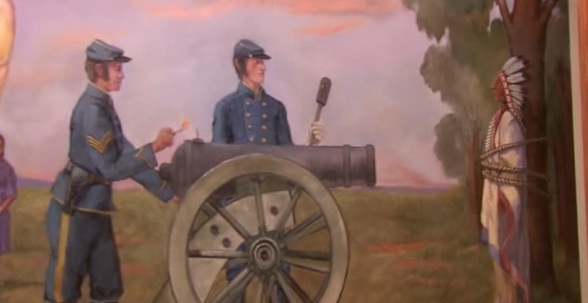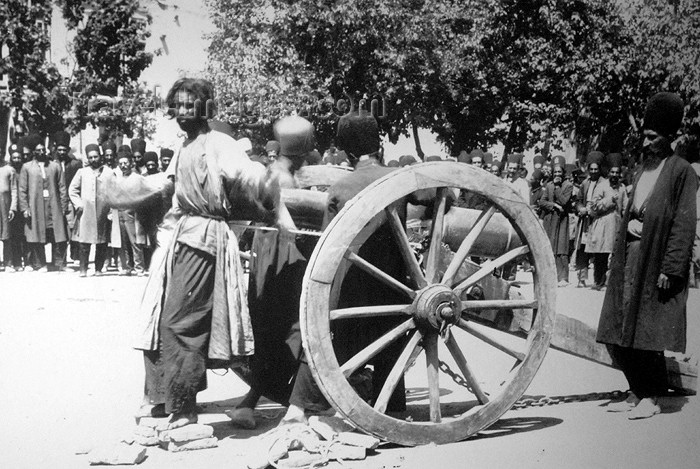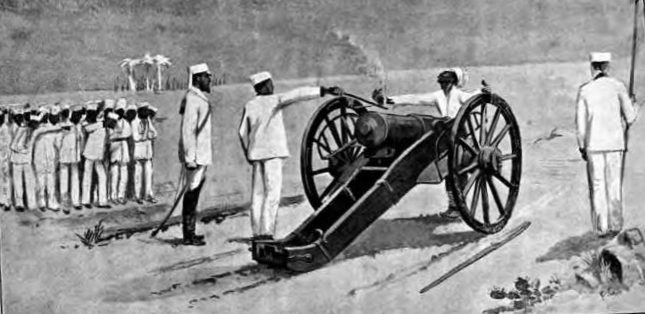
Posted on 05/14/2018 8:58:18 AM PDT by harpygoddess
Execution by cannon was a method of execution in which the victim was typically tied to the mouth of a cannon which was then fired. The prisoner is generally tied to a gun with the upper part of the small of his back resting against the muzzle. When the gun is fired, his head is seen to go straight up into the air some forty or fifty feet; the arms fly off right and left, high up in the air, and fall at, perhaps, a hundred yards distance; the legs drop to the ground beneath the muzzle of the gun; and the body is literally blown away altogether, not a vestige being seen.
Although it was used in several cultures historically, this method of execution is most closely associated with the colonial government of the British Raj. Following the Indian Rebellion of 1857, "blowing from a gun" was a method the British used to execute rebels as well as for those natives found guilty of desertion.
The destroying of the body and scattering the remains over a wide area had a particular religious significance as a means of execution in the Indian subcontinent as it effectively prevented the necessary funeral rites of Muslims and Hindus. Thus, for believers the punishment was extended beyond death.
(Excerpt) Read more at vaviper.blogspot.com ...
"The commanding officer directed port-fires to be lit. “Ready!” “Fire!” and the drama was played out. An eye-witness says: “The scene and stench were overpowering. I felt myself terribly convulsed, and could observe that the numerous native spectators were awe-stricken — that they not only trembled like aspen-leaves, but also changed into unnatural hues. Precaution was not taken to remove the sponge-and-load men from the muzzles of the guns; the consequence was that they were greatly bespattered with blood, and one man in particular received a stunning blow from a shivered arm!“
HilLIARy...
Seems like it would be pretty painless.

We’d have to reactivate the 8” howitzers for Hillabob.
The British were a sick bunch during the Raj. Best thing that ever happened to India was getting out from under them. I’ve read accounts of American World War II officers based in India who were shocked at the way the Brits treated Indians.
Mueller... Mueller
With apologies to Matthew Broderick
Not so much the death itself, but the great trepidation felt in the events leading up to being spread out on the mouth of the cannon...
Blown to hell and gone.
Comey. Brennan. McCabe. Mueller. Rosenstein. Lynch. Holder. Clinton (your choice or both). Power. Kerry. Obama. Soros.

Having William Conrad fall on you would very likely hurt.
Insert Jackie the Jokeman laugh here———

Parks & Rec

Iran - Shiraz: execution by cannon - 19th century death penalty ...


...not to mention the two foot wide
40 odd feet trail of human feces leading to the cannon....
I have the opposite view sorry. IMO the best thing that ever happened to India was Brit occupation.
India is an incredibly depressing place.
The Brits have been brutal despots for centuries.
Below is how they handled what they called Treason:
High Treason under King George III, during our Revolution, 1776:
Since High Treason was, and arguably remains, the most serious capital crime, testimony of two witnesses to the same overt act was required to convict, and the punishment in the Eighteenth century was severe. Blackstone states that “the punishment of high treason in general is very solemn and terrible”:
1. That the offender be drawn to the gallows, and not be carried or walk: though usually (by connivance length ripened by humanity into law) a sledge or hurdle is allowed, to preserve the offender from the extreme torment of being dragged on the ground or pavement
2. That he be hanged by the neck and then cut down alive
3. That his entrails be taken out and burned, while he is yet alive
4. That his head be cut off
5. That his body be divided in four parts
6. That his head and quarters be at the king’s disposal [6].
The punishment did not end with the personal suffering of the offender; the punishment extended to his or her family. The law states that a person who is found guilty of treason must also undergo “forfeiture” and “corruption of blood.” In forfeiture, the person is forced to give all their lands and property to the state. Corruption of blood prevents the person’s immediate family and hereditary heirs from owning property or conducting business— in effect ruining the offender’s family forever.
Today, the most famous offenders of the eighteenth-century English treason laws are the American revolutionaries. The Declaration of Independence violates the 3rd law of treason in this statement: “And for the support of this Declaration, with a firm Reliance on the Protection of divine Providence, we mutually pledge to each other out Lives, our Fortunes, and our sacred Honor” [8]. When John Hancock, Samuel Adams, and other founding fathers signed this statement, they did not sign some empty philosophical statement, they signed their death warrant.
This action displayed their dedication to the cause of American independence and the ultimate disloyalty to King George the Third (below). Until the Declaration of Independence, Washington, Jefferson, Adams and the others only disagreed with Parliament, not the Crown; in fact, after a day of fighting the British soldiers, Washington and his officers would toast the King before dinner. This document is important because it marks the revolutionaries’ acknowledgment that the corruption of the English government was not contained within the Parliament, but extended all the way up to the King; it marks the point of no return: either the revolutionaries were going to gain their independence from England and create a new country, or they were going to lose the war to the best army in the world, forfeit everything they owned, ruin their families, and be drawn and quartered.
Baloney. The Brits were simply slavers. The main reason the Brits stopped the slave trade was to stop competition. They built their plantations where the slaves were and had no need to transport them. Furthermore any Indian who ever dared try to improve the life of Indians was strapped to the front of a cannon.
Disclaimer: Opinions posted on Free Republic are those of the individual posters and do not necessarily represent the opinion of Free Republic or its management. All materials posted herein are protected by copyright law and the exemption for fair use of copyrighted works.